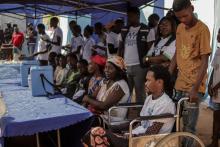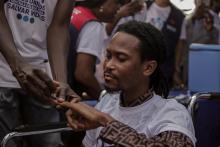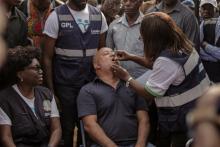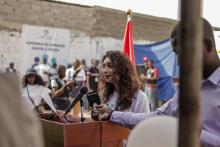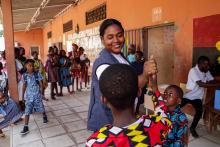Cholera vaccination campaign in Angola: A coordinated response to save lives
After weeks of anguish and uncertainty, the sun shines again in the Paraíso neighborhood in Cacuaco. In his wheelchair, António is wheeled towards the vaccination team at the local community center. Once filled with worry and sadness, his gaze now conveys relief and gratitude. The cholera that devastated so many lives in his neighborhood has left a trail of pain. He has lost friends and neighbors. However, as he approaches the vaccination team, a genuine smile appears. “I feel more relieved; I consider myself immunized; my joy can be summed up in a few words - Thank you, the vaccines save lives!’ he declares emotionally.
Bairro Paraíso is the epicenter of the cholera outbreak that has plagued Angola since the first confirmed case on 7 January 2025. In response to this public health emergency, the Ministry of Health, with the support of the World Health Organisation (WHO), the United Nations Children’s Fund (UNICEF), and the World Bank, carried out a vaccination campaign to immunize around 930,000 people aged one year and above in the provinces most affected by cholera, namely Luanda, Bengo and Icolo e Bengo. The aim is to stop the spread of the disease and protect the population to prevent further loss of life.
For António, as well as a means of prevention, the vaccine is a new opportunity for his community. “With this vaccine, I know we’ll be better protected. With the availability of drinking water and if we all comply with basic sanitation measures, our community can resume activities and live without fear,” he says, relieved. “Now the children will be able to go to school without fear of anything happening to them.”
As of 11 February 2025, Angola has registered 3,402 cases of cholera and 114 deaths, with the outbreak affecting the provinces of Kwanza Sul, Cunene, Luanda, Huambo, Huila, Icolo e Bengo, Bengo, Malanje, Zaire and Kwanza Norte. The Ministry of Health, with the support of the World Health Organisation (WHO) and other partners, has taken urgent measures such as strengthening the capacity of health professionals, distributing water treatment solutions, implementing basic sanitation measures, and community mobilization. Vaccination, however, is a decisive response to limit the damage and protect vulnerable populations.
“The United Nations, partners, and the private sector are here to support and work alongside the government in this mission,” says Dr. Zahira Virani, Resident Coordinator of the United Nations System in Angola. “The vaccination campaign is an important milestone, and my message is simple: get vaccinated, protect yourself, and help spread correct information about prevention.”
The cholera vaccination campaign took place from 3 to 7 February 2025, and the strategy adopted included the installation of fixed posts in strategic locations such as health units, health centers, churches, and orphanages, as well as mobile teams that moved around the most remote communities to ensure that no one was left behind.
“The mobile teams played a fundamental role. They met the population in the most remote places, which made all the difference,” explains Dr Maria Quaresma Gomes dos Anjos, WHO Immunisation Officer in Angola. She added, “With the reinforcement of mobilization and support from the communities, we had positive adherence and managed to achieve 99.5% coverage thanks to the strong work of community engagement and awareness-raising.”
With the efforts of more than 1,974 vaccination teams, António, along with many other citizens, received the necessary protection against cholera. “My community and I can’t thank the government and all the partners enough for informing us about preventing cholera and bringing practical solutions, such as water treatment, maintaining good hygiene practices, and vaccination. With this vaccine, we can be protected and save lives,” says António.
For the community of Cacuaco, where cholera has caused so much loss, vaccination is more than a public health measure. It represents an opportunity for a fresh start, where families can live without the daily fear of losing a loved one to cholera. Antonio and so many other families, now protected, can look to the future with more hope, knowing that they are protected and can contribute to containing the cholera outbreak and saving lives.
However, vaccination alone is not enough to eradicate cholera. To prevent new outbreaks, protect the community’s health, and ensure effective and lasting protection, the WHO recommends other well-known measures such as safe drinking water, good hygiene, adequate surveillance, and rapid case management.
“With determination, solidarity, and effective measures, we will beat cholera. Cholera vaccination is not just a public health measure. Still, more than that, it is a commitment to a healthy future for all and to the progress and prosperity of our country”, says the Minister of Health of Angola, Dr. Silvia Lutucuta.




